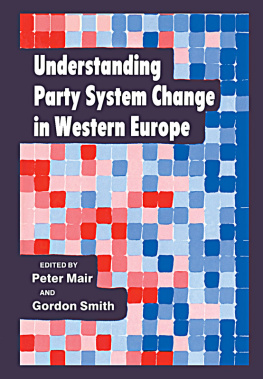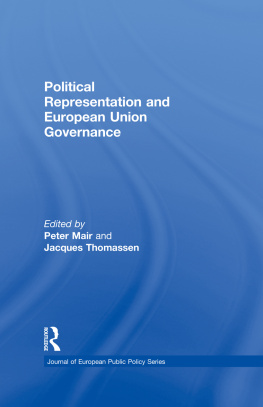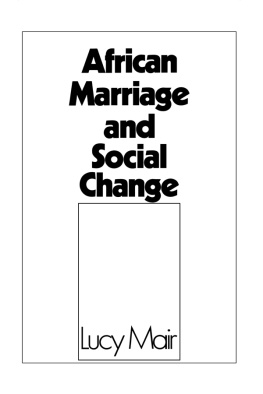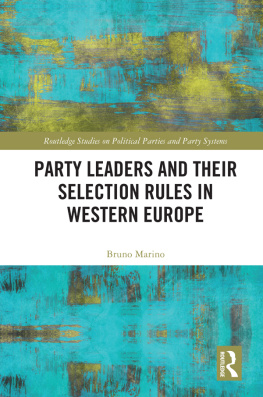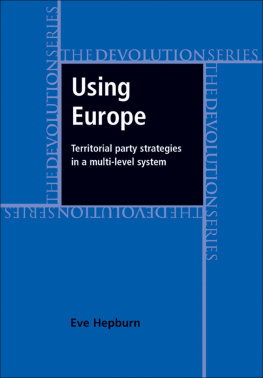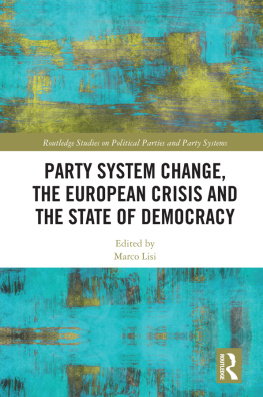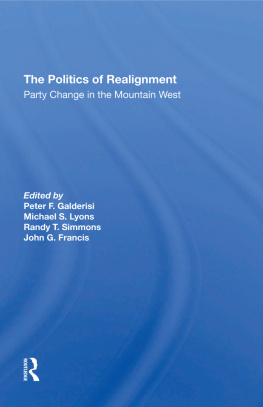UNDERSTANDING
PARTY SYSTEM CHANGE
IN
WESTERN EUROPE
Edited by
PETER MAIR
and
GORDON SMITH

FRANK CASS
First published in 1990 in Great Britain by
FRANK CASS & CO. LTD.
2 Park Square, Milton Park,
Abingdon, Oxon, 0X14 4RN
and in the United States of America by
FRANK CASS
270 Madison Ave,
New York NY 10016
Transferred to Digital Printing 2005
Copyright 1990 Frank Cass & Co. Ltd
British Library Cataloguing in Publication Data
Understanding party system change in Western Europe.
1. Western Europe. Political parties
I. Mair, Peter II. Smith, Gordon, 1927- III. West
European politics
324.24
ISBN 0-7146-3381-X
Library of Congress Cataloging-in-Publication Data
Understanding party system change in Western Europe / edited by Peter
Mair and Gordon Smith.
p. cm.
Papers from the Workshop on Change in West European Party Systems.
ISBN 0-7146-3381-X: 20.00
1. Political parties-Europe-Congresses. I. Mair, Peter.
II. Smith, Gordon B.
JN94.A979U48 1990
324.24009-dc20
89-35989
CIP
This group of studies first appeared in a Special Issue on Understanding Party System Change in Western Europe of West European Politics, Vol. 12, No. 4 (October 1989), published by Frank Cass & Co. Ltd.
All rights reserved. No part of this publication may be reproduced in any form or by any means, electronic, mechanical, photocopying, recording or otherwise, without the prior permission of Frank Cass and Company Limited.
Typeset by Selectmove Ltd, London
Contents
Gordon Smith and Peter Mair
K.R. Luther
Kris Deschouwer
Lars Bille
Howard Machin
Bart Tromp
Geoffrey K. Roberts
Mark Donovan
Peter Mair
Knut Heidar
Gordon Smith
Peter Mair
Notes on Contributors
Lars Bille is a Senior Lecturer at the Institute of Political Studies, University of Copenhagen. His writings include Det partipolitiske samarbejds-mnster i Danmark 19641965(1917) and Samarbejdsmulighederne mellem Socialdemokratiet og SF' in konomi og Politik, Vol. 60, No. 2 (1987).
Mark Donovan is a research student at the London School of Economics. He is completing his doctoral thesis on the Italian Christian Democrats and the concept of the centre.
Kris Deschouwer is Professor of Politics at the Free University of Brussels. His research and publications are concerned with political party theory and party organisation.
Knut Heidar is a Senior Lecturer in the Department of Political Science at the University of Oslo. His publications include Norske Politiske Fakta 18441983 (1983), and Partidemokrati p prve (1988).
Richard Luther is Senior Lecturer in Politics at Lancashire Polytechnic. His publications include contributions on the Freedom Party of Austria in E. Kirchner (ed.), Liberal Parties in Western Europe (1988), and on Austrian federalism in M. Burgess (ed.), Federalism and Federation in Western Europe, (1986).
Howard Machin is Lecturer in French Politics and Government at the London School of Economics and Political Science. He has written widely on French local government, regional politics, parties and elections and is currently co-editing Developments in French Politics (forthcoming).
Peter Mair is Senior Lecturer in Government at the University of Manchester. He is the author of The Changing Irish Party System (1987) and co-author of Identity, Competition and Electoral Availability (forthcoming). He co-edited Western European Party Systems (1983), Party Politics in Contemporary Western Europe (1984), and How Ireland Voted (1987).
Geoffrey K. Roberts is Reader in Government at the University of Manchester. His publications include An Introduction to Comparative Government (1986), West German Politics (1972), and (with Jill Lovecy) West European Politics Today (1983).
Gordon Smith is Professor of Government at the London School of Economics and Political Science. The author of Politics in Western Europe (1989) and Democracy in Western Germany (1986), he is a co-editor of Developments in West German Politics (1989), and joint founding editor of West European Politics.
Bart Tromp is Senior Lecturer in Political Science at the University of Leiden, and Professor of International Relations at the University of Amsterdam. His publications include De Samenieving als Oplichterij (1977), Het Falen der Nieuwlichters (1981), and Karl Marx (1983).
Introduction:
How Are West European Party Systems Changing?
It has become almost commonplace to observe that West European party systems are caught up in a process of change. The symptoms are varied: the sudden entry of new parties, the rapid decline of others, rising levels of electoral volatility, and generally the growing vulnerability of parties faced with the increasing restlessness rootlessness even evident in European electorates. The potential for change is far from exhausted, since the falling levels of party identification have not been fully translated into electoral change. Nevertheless, the old maps of electoral behaviour have become unreliable, and it is reasonably clear why they have become so: the cumulative effects of socio-economic and other developments appear to have steadily eroded the once firm cleavage structures on which voting loyalties were first built and party positions were cemented.
What does the evidence of an apparent electoral flux mean for the future development of West European party systems? It is here that we begin to move into uncharted territory, since there are various constructions that can be placed upon the facts of electoral change. On one view, what we are witnessing is a process leading to a permanent dealignment, a detachment of voters from parties tout court, with all kinds of negative implications, not only for the parties but for political systems as a whole. A sharply opposed interpretation is that the present phase is temporary, an interim condition pending the movement towards a realignment of electorates and parties along new cleavage lines. There is a third view: that the present flux is more a reshuffling of the pack, that in a sense the status quo of party systems is being maintained. That would follow if the electoral interchange is, in fact, largely maintained between closely related parties, signifying the decline of some and the rise of others, but without leading to a fundamental realignment: the older conflict areas of European politics are still relevant as are left and right as points of orientation for parties and electorates alike.
This excursion into the possible implications of electoral change shows the difficulties likely to be encountered in analysing the effects on party systems. Is one European-wide pattern emerging or are there several? It may well be the case that the underlying electoral pressures are similar in most countries, but what will certainly be different is the response of parties to them, and the degree of success of those responses. The room for individual variation both within and between systems is considerable. Parties are necessarily influenced by their particular traditions, and the institutional environment from the structuring of the state to the nature of the electoral system imposes a further band of constraint upon them. Parties vary, too, in their perceptions of political developments and the possible significance of electoral change; a mis-reading of the signs invites harsh penalties. Dealings with other parties, whether in competition or in coalition, are affected by all these factors as well as by the nature of the party system itself: how parties interact is a key factor in the process of system change.


